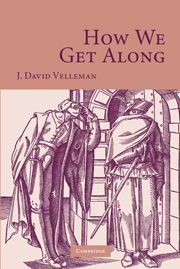5 - Foundations
Published online by Cambridge University Press: 05 July 2015
Summary
Consider another picture of what it would be for a demand to be ‘objectively valid’. It is Kant's own picture. According to this, a demand will be inescapable in the required sense if it is one that a rational agent must accept if he is to be a rational agent. It is, to use one of Kant's favourite metaphors, self-addressed by any rational agent. Kant was wrong, in my view, in supposing that the fundamental demands of morality were objective in this sense, but that is not the immediate point, which is that the conception deploys an intelligible and adequate sense of objectivity. It seems to have little to do with those demands being part of the fabric of the world; or, at any rate, they will be no more or less so than the demands of logic – which was, of course, part of Kant's point.
Bernard Williams, “Ethics and the Fabric of the World”In explaining how the demands of morality can be objective without being “part of the fabric of the world,” Bernard Williams is responding to John Mackie, who thinks that being woven into that fabric is a necessary condition for objectivity. Williams points out that moral demands might be woven into the practical point of view instead.
- Type
- Chapter
- Information
- How We Get Along , pp. 115 - 158Publisher: Cambridge University PressPrint publication year: 2009

